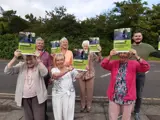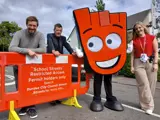Living Streets Scotland
We are Living Streets Scotland, part of the UK charity for everyday walking.
We want to create a nation where walking and wheeling is the natural choice for everyday, local journeys.
We deliver our walk to school programme across Scotland, enabling and encouraging more children to walk to school. Our work with communities empowers groups to deliver improvements to their walking environment so they can enjoy vibrant streets and public spaces. And our campaigning on issues such as footway parking and 20mph speed limits helps to create safer and more welcoming streets.

A closer look at our work
Latest news
WALKING THE TALK - REDUCING TRAFFIC IN CAR DOMINATED PLACES
Thanks to everyone who joined us in Stirling on the 7 March 2023 for Living Streets Scotland’s Big Walking Seminar, which you can watch back here >
Our #BigWalkingSeminar is LIVE! https://t.co/i1AnABpaV6
— Living Streets Scotland (@LStreetsScot) March 7, 2023
Hello from Stirling where we are back with the final panel discussion from our #BigWalkingSeminar https://t.co/QVIbZL89ga
— Living Streets Scotland (@LStreetsScot) March 7, 2023
Who we work with



Contact us
Living Streets Scotland
The Melting Pot
15 Calton Road
Edinburgh
EH8 8DL
0131 573 7500
[email protected]
For any media enquiries, please contact the Living Streets press team on 020 7456 9790, or out of office hours, 07545 209865.
Alternatively, you can email [email protected]
Follow us on X (formerly Twitter) @LStreetsScot














